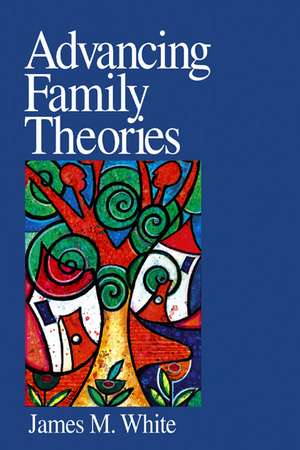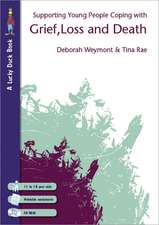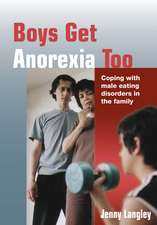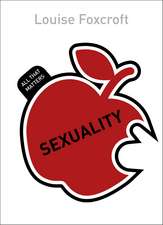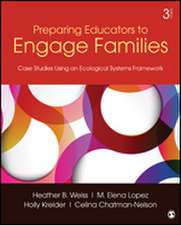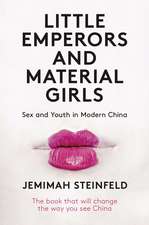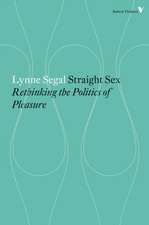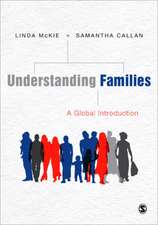Advancing Family Theories
Autor James M. Whiteen Limba Engleză Paperback – 18 oct 2004
`Professor White has written a "must-read" book for anyone interested in family theory. This well-written and timely text . . . tackles difficult topics head on, offering pragmatic solutions and nicely nuanced insights. Advancing Family Theories is exactly the sort of book that lends itself well to both the classroom and more specialized theoretical and empirical work' - Jay Teachman, Western Washington University
How can the study of families be scientific? What is the difference between postmodern and positivistic approaches? What is the role of models and metaphors in constructing our theoretical knowledge? In Advancing Family Theories, author James M White addresses such difficult questions that have been longstanding issues within the field of family studies and examines these matters from a social science perspective.
Advancing Family Theories explores two contemporary theories of the family-rational choice theory and transition theory. These diametrically different approaches illuminate what differing theories reveal about families. The book also discusses how meta-theories can assist in building and refining theory and offers insight on the "understanding versus explanation" debate. Advancing Family Theories gives students a precise notion of what a theory is and how theories work in research. The book not only looks at philosophical realms but also examines particular substantive theory to explain and predict family behaviors.
Key Features:
- Uses a theme of "models and metaphors" to unite what often seems to be conflicting approaches to theory and context
- Allows readers to view differing research as theoretical and complementary rather than competitive and exclusive
- Shows how to develop thesis research questions and how to identify theory relevant to substantive research interests.
Advancing Family Theories is designed for advanced undergraduate and graduate courses on family theory, research, and methods. It is an excellent supplemental text to Family Theories, Second Edition by James White and David Klein (SAGE, 2002) and is brief enough to be used in a number of classroom settings. The book helps students with the task of taking abstract and very general theories and reducing them to a level of specific research models and hypotheses.
Preț: 826.33 lei
Preț vechi: 1131.96 lei
-27% Nou
158.14€ • 163.37$ • 131.61£
Carte tipărită la comandă
Livrare economică 25 martie-08 aprilie
Specificații
ISBN-10: 0761929053
Pagini: 216
Dimensiuni: 152 x 229 x 11 mm
Greutate: 0.3 kg
Ediția:New.
Editura: SAGE Publications
Colecția Sage Publications, Inc
Locul publicării:Thousand Oaks, United States
Recenzii
"A perfect companion text for graduate courses on family theories. It is refreshing to have a single author pull no punches in articulating a viewpoint on where we have gone astray in family theory and how we can find our way again. Jim White has accomplished the nearly impossible mission of being informative, balanced, clear, and provocative at the same time."
"This book fills an important niche in the family literature. Books on family theory often focus on describing a variety of conceptual frameworks; this book spotlights the process of theorizing. Beginning with an in-depth discourse on the philosophy of science and a history of theory development in the family field, White wrestles with the vital question of how we develop theory in a post-positivist world. It is a valuable source for seasoned scholars as well as for students who are just being introduced to family theories."
"Making a strong case for the importance of theory in social science, the author argues that theories on the family would assist understanding across cultural contexts and variations."
Cuprins
Acknowledgments
1. Introduction
Part I: Understanding Theory: Product and Process
2. Family Theory and Social Science
3. Science and Its Critics
4. Theory, Models, and Metaphors
5. Functions and Types of Theory
Part II: Advancing Substantive Family Theory
6. Rational Choice Theory and the Family
7. Transition Theory
Part III: Beyond Theory: Ethics, Ideology, and Metatheory
8. Empirical Research and Theory
9. Theory and Human Values
10. Conclusion: Theories as Tools for Studying Families
References References References
Author Index
Subject Index
About the Author
Notă biografică
James M. White is a Professor in the School of Social Work and Family Studies at the University of British Columbia and resides with his wife and three daughters in Vancouver, Canada. His research interests include family development as well as marital interaction and communication. He is the author of Dynamics of Family Development (published in the U.S. in 1991 and translated into Japanese in 1994), as well as numerous articles that have appeared in the Journal of Family Issues, Journal of Social & Personal Relationships, Journal of Marriage and Family, and elsewhere. His authored and co-authored book chapters include a chapter with R. H. Rodgers on family development in the Sourcebook of Family Theories & Methods (1993). He has served as referee for numerous journals in family relations and public health and is an Associate Editor for the Canadian Journal of Public Health, Journal of Comparative Family Studies, and The International Encyclopedia of Family Relationships. He is a past-president of the Northwest Council on Family Relations, whose membership includes academics, practitioners, and therapists from the states and provinces of the Pacific Northwest. He is also an Honorary Fellow of the National Council on Family Relations.
Descriere
Advancing Family Theories is an excellent supplement to Family Theories, Second Edition (SAGE, 2002), or is effective on its own. The book helps students with the task of taking abstract and very general theories and reducing them to a level of specific research models and hypotheses.
